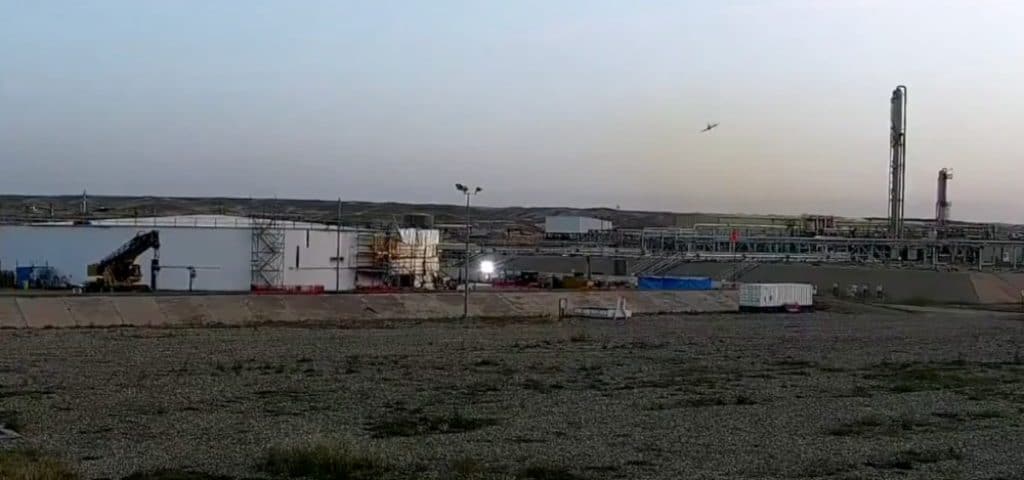
An unmanned aerial vehicle (UAV) targeted the Khor Mor gas field in northern Iraq’s autonomous Kurdistan Region on February 2, 2025. It is the latest kamikaze drone attack on the gas field run by Dana Gas. There have been nine attacks in four years on the same site, according to Iraqi media reports.
An attack in April 2024 killed four people. The UAV used in that incident was identified through surveillance footage as an Iranian-style Shahed drone of the kind employed by Iranian-backed militias in Iraq.
On February 4, the US Embassy in Baghdad condemned the latest attack, which happened on the same day Iraq’s parliament moved to end a dispute with the Kurdistan Region that focuses on energy issues and affects Iraqi oil exports. The attack also took place amid increasing calls for Iranian-backed militias in Iraq to lay down their arms and be taken under state control.
The Dana Gas facility at Khor Mor is a 120-kilometer drive west of Sulaymaniyeh, the capital of the Sulaymaniyah Governorate in the Kurdistan autonomous region. It is in the Chamchamal District that borders Kirkuk, which has often been disputed between Baghdad and Iraqi Kurdistan.
Iranian-backed militias have operated in the Kirkuk region since 2017, when the militias backed Baghdad in retaking Kirkuk from Kurdish forces at the end of the war against the Islamic State (IS) in Iraq. Iraq’s Popular Mobilization Units (Hashd al Shaabi) rejected claims that one of their affiliated militias had launched a drone from near Tuz Khurmatu southeast of Kirkuk, according to Shafaq, an Iraqi media site.
The attack on the gas facility appears to have wider ramifications in the context of recent changes in Iraq and the region. Iranian-backed militias ended their drone attacks on Israel after the January ceasefire between Israel and Hamas. Before this cessation, they had carried out numerous long-range drone attacks under the banner of the Islamic Resistance in Iraq. Iranian-backed militias also ended most operations against US forces in Iraq and Syria in the wake of a deadly attack on US troops in Jordan in January 2024.
However, the militias in Iraq could shift their focus as they ponder what to do next now that there is a new administration in Washington. Reports indicate the Trump administration could return to its “maximum pressure” policy on Iran. In 2019, Iranian-backed militias in Iraq increased attacks on US forces during the first Trump administration, and they have vowed to continue those operations over the years. However, the Shiite Coordination Framework in Iraq, some of whose members have ties to the militias, are in a “state of confusion” over how to respond to the new US administration, according to an Iraqi media report.
The US Embassy in Baghdad issued a statement on the February 2 attack on the gas field. “We condemn the attack on the Khor Mor gas field and urge the Government of Iraq to hold the perpetrators accountable,” the Embassy posted in Arabic and English.
The Dana Gas company said the February 2 attack did not damage its facilities and did not injure anyone. Operations continued at the site as usual. Kurdistan 24 reported that the operations continue with “strict security protocols” and “Dana Gas assured stakeholders that comprehensive security measures are in place to protect personnel and assets.” The company stated, “We remain in close coordination with all relevant authorities and security forces, who are monitoring the situation closely to ensure continued safe operations.” Iraqi Prime Minister Mohammed Shia al Sudani has also demanded an investigation.
Dana Gas, a UAE company based in Sharjah, operates the Khor Mor field. It is part of the Pearl Petroleum consortium, which also includes Crescent Petroleum, formed in 2009. “Despite repeated attacks on the Khor Mor gas field in recent years, Dana Gas and the authorities in the Kurdistan Region have demonstrated unwavering determination and resilience in maintaining operations,” Kurdistan24 noted.
It’s unclear if the attack was intended as a message to Baghdad and the Kurdistan Region regarding a recent parliamentary decision. “Iraq’s parliament on Sunday approved a budget amendment to subsidise production costs for international oil companies operating in the semi-autonomous Kurdistan region in a move aimed at unblocking northern oil exports, lawmakers said,” Reuters reported on the same day the attack unfolded. It is clear that in the past, the facility has been a prime target for Iranian-backed Iraqi militias using Iranian drone technology. The gas field is considered one of the largest in Iraqi Kurdistan. “The gas is a key fuel source for electricity generation plants in the Kurdistan Region,” the Kurdish Rudaw Media Network notes.
The attacks on Khor Mor are also part of a wider pattern of attacks on Iraqi Kurdistan by Iran and Iranian-backed groups. In January 2024, the Islamic Revolutionary Guard Corps took credit for an attack on Erbil, the capital of the autonomous region, that killed four people. The Kurdistan Regional Government also said three drones were shot down on January 16, 2024.







